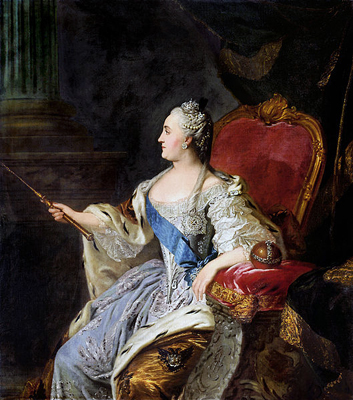
Portrait of Empress Catherine by Russian painter Fyodor Rokotov, 1763
The bard of the Solidarity Trade Union – the brilliant singer, songwriter, poet Jacek Kaczmarski – sang of Russian Empress Catherine II thus:
| Na smyczy trzymam filozofów Europy Podparłam armią marmurowe Piotra stropy Mam psy, sokoły, konie – kocham łów szalenie A wokół same zające i jelenie Pałace stawiam, głowy ścinam Kiedy mi przyjdzie na to chęć Mam biografów, portrecistów I jeszcze jedno pragnę mieć |
I keep Europe’s philosophers on a leash Propped up Peter’s marble ceilings with armies I’ve dogs, falcons horses – wildly love the hunt Around me only rabbits, deer. I erect palaces, cut off heads Whenever I feel like it I’ve biographers, portraitists And I desire just one more |
Catherine wants a man – that one man who will finally satisfy her. She’s had many, but finds their weak fingers repulsive. She wants a lover as expansive and great as her vast empire.
And then for the punchline – via Kaczmarki’s furious guitar rifts, throaty voice and unparalleled sense of rhythm:
| Gdyby się taki kochanek kiedyś znalazł… – Wiem! Sama wiem! Kazałabym go ściąć! |
If such a lover were ever to be found… – I know! Oh I know! I’d order his head cut off! |
Catherine did, in fact, have people’s heads cut off, and she did have many lovers. One was the last king of Poland, Stanisław August Poniatowski. During his reign, the Russian Empire – with Catherine at its helm – along with the Prussian and Austrian Empires partitioned Poland in 1795. Poland ceased to exist as a nation for the next 123 years, though Poles continued to secretly speak, read, write, educate their children and pass on their Polish heritage. Life was different in each of the partitions, but it was harshest under the Russians, where simply speaking Polish on a city street could get you thrown into prison.
Poland’s relationship with Catherine thus runs the gamut from distrust and suspicion to fear and hatred; understandably so. But there’s no doubt that Catherine was a formidable historical figure – and a fascinating one.
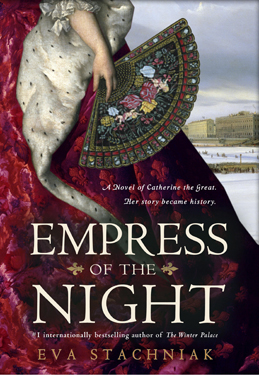 Polish-Canadian novelist Eva Stachniak recently released her second book about Catherine, Empress of the Night. Her first is The Winter Palace. She visited Washington, DC in April to present Empress at a book talk at the Hillwood Museum to coincide with an exhibit on Catherine.
Polish-Canadian novelist Eva Stachniak recently released her second book about Catherine, Empress of the Night. Her first is The Winter Palace. She visited Washington, DC in April to present Empress at a book talk at the Hillwood Museum to coincide with an exhibit on Catherine.
“There’s not just one Catherine,” Stachniak said. “There are many.” Foreigner (Catherine was German, brought to Russia to be married off); young mother; anointed empress who reformed Russia; art collector; usurper who condoned her husband’s murder; masterful politician; savvy manipulator of public opinion. A “queen of spin,” – and if you’re Polish, “she’s the one who with Prussia and Austria wiped Poland off the map.”
As part of her research process, Stachniak traveled to St. Petersburg to experience Catherine’s surroundings firsthand. She was there during Russia’s famous white nights; she also visited museums that housed objects Catherine had once touched.
I interviewed Stachniak over the phone a few days later; the interview below has been edited for clarity.
* * *
You – and your family – were directly impacted by Catherine’s policies. How did you come to write a series of books about the empress?
I think that’s one of the reasons why. I grew up in Poland, and Catherine was always part of our consciousness. You always talked about her, but in an abstract way: she was this hypocritical, terrible power that crushed Poland, put her lover on the Polish throne. But there was never anything personal about her. It was a stereotype, but always a very limited one. I didn’t know she was German when I was growing up. I didn’t know she had a child with Poniatowski.
I started thinking about her. And then I read her memoirs. That got me into wanting to approach her from a very different point of view.
Writers constantly reveal themselves through their writing. In these memoirs, she’s frustrated. She’s trying to justify her political murder, taking away the crown from her husband. She can’t really justify it. She would have to admit to being a bold, imperial woman who took what she wanted. She wanted to manipulate the reader into believing that a lot of what she did came out because she had no power, no choice.
I liked that tension of the image she wanted to project of herself, and the actual woman who’s writing the memoirs.
I like to go back to stories behind the Iron Curtain. It is part of the universal human heritage. But they are under-represented. So that was another attraction – I could talk about my own past, my family connections, as I am from the Russian partition on my mother’s and father’s side.
I love the idea of looking from another’s point of view. [With] the Empress Catherine, looking at Poland, Turkey, the Crimea, Russian politics and the Russian future – not from the Polish point of view but from the Russian.
I think that’s what immigrants do very often. We like to see how it is from the other side.
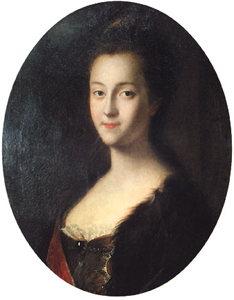
Portrait of Great Duchess Cathrine Alexeevna the (future Empress Cathrine) in her first year of marriage and first year in Russia, by French artist
Louis Caravaque, 1745
I find a great affinity for anybody who went through what I went through – leaving one country and arriving in another, learning a new country and its ways.
We all write what we have lived through. I find immigrants a great inspiration. I don’t say I’m always going to. But for now I have found these fascinating characters I can relate to. In learning a new culture, they were able to find a way much easier than people who were born in it. Or, they were able to break the barriers.
Catherine hears that all the time: Russians don’t like foreigners, you have to appear Russian. How do you become Russian? That for me is a great fascination.
In your talk, you called her “a woman who believes in herself.” And as she grows older and more powerful, she takes what she wants. Can we call her a feminist?
We can call her a feminist; she would not have used that word. She often expressed regret that she was not born a man, which was something a lot of women said in the 18th and 19th centuries. She said at some point, if I didn’t have petticoats but britches I would have done so much more. I don’t know; she did a lot!
She definitely wanted to change the position of women. The Smolny Institute – it was her idea that an educated mother will bring up children who will be better citizens, better Russians, who will foster her enlightened version of Russia. She paid for the education of aristocratic women but also a separate institution for the education of the daughters of the townspeople. She did believe in giving women a far more active role.
Russia was the first country to appointment a woman – [Ekaterina] Dashkova, Catherine’s appointment – to be the head of the national Academy of Arts and Sciences.
[Catherine] truly believes that if you are educated and good at what you do, it doesn’t matter if you’re a woman or a man, you should be given equal opportunity. And women should be given chances, because they are very important in the well-being of a country. She modeled that behavior for other women in Russia, so there was this interesting sense of women taking encouragement and modeling themselves on her.
We could call her an early proto-feminist, definitely. She was also an expert monarch for so long that she developed a sense of being so special that she could do whatever she wanted, which was true of every czar or czarina that Russia had.
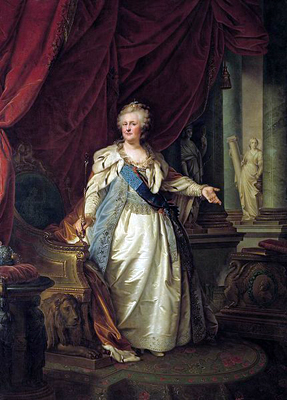
Portrait of Empress Catherine by Austrian-Italian painter Johann Baptist von Lampi the Elder, 1793
She really wanted to show the world that Russia wasn’t barbaric with regards to culture and art. But her actions are barbaric! She has people killed. And her actions towards Poland – and other nations – are certainly barbaric.
We would have to define what she meant by barbaric and what we mean by it. What she meant is that Russia was not doing anything that other countries weren’t. What was the French Revolution? The treatment of colonies? What was the British Crown doing in America? And slavery?
She had a very clear sense: Do not judge me with other standards than you judge yourself.
In that sense, Russia was no different. You defeated your enemy and that was it.
However, when we judge her from a more moral point of view: was Russian imperial policy moral? No, it wasn’t, it was pro-Russian. It never cared about anybody else but Russia. But, so was British policy, French and German. Catherine would say, Well, grow up and accept it, this is the way of the world. She had a Machiavellian, realistic point of view.
Is that moral? Not from the personal point of view, not from the point of view of the defeated. However, probably very realistic.
Are there Polish historical figures that inspire or interest you, and any Polish topics you’d like to delve into someday?
I always like to have a Polish door to my novels. In “The Winter Palace,” my spy-narrator was Polish. In “The Garden of Venus,” my main character was Greek but went to Poland and was surrounded by Polish characters, and Polish parts of history were part of the narrative.
I do it because I’m always interested in retelling stories. Polish history is one I know very well, and many of the stories need retelling. My next interest and inspiration is Bronislava Nijinska, both of her parents were Polish. She was born in that part of Poland that was part of Russia at that time.
I don’t think I’ll ever be interested in a character that is purely Polish that has nothing to do with any other culture. Not that I don’t find these characters interesting, but Polish writers should tackle them, while I with my immigrant sensibility really need to look at characters who cross cultures, who are from the borders – that’s where my interests and passions lie.
Do you consider Polish or English your first language, and what’s it like for you writing in English?
I left when I was 29. Polish is my first language. However, English was my language from childhood as well, because I started learning it as a child and then went to the English Department in Poland, and the English Department in Canada. So it was the language of my profession. I think I am fully bilingual at this point.
But because I am telling these stories to my Canadian readers, [English] became the voice of my writing.
What’s a good writing day for you? What’s your writing process like?
Because it is my passion, I really look forward to my writing. My problem is sometimes stopping myself. Maybe because I started writing later in life, I didn’t have time to get tired of it. I don’t have a problem with motivation.
I try to retain a certain routine. Morning is for writing. I find that right when I wake up, from 7 till about 10 or 11, these are the creative times.
Then it’s time for what I call the business of writing – publicity, maintaining my website. For the first activity I need a lot of solitude, so I don’t pick up the phone, I disconnect my email for that period. I won’t check things online. If I don’t have that time of solitude and silence, then the writing is very superficial.
How do you create your worlds? You have a lovely balance between history and narrative.
I’ve learned the hard way that I cannot do too much research. That I have to set myself a deadline for this first wave of research. Because whatever you touch, you discover you know very little about it. And then when you start learning, there’s more and more stories that come out: This is interesting, and that is interesting. And you can go on like that for 20 years and never start writing. So I give myself three, four months maximum for the first general research on the topic I didn’t know much about. And then I force myself to stop.
I know I’ll have to do additional research. In the first period I gather a lot of information, books, so that if I need details I know where they are. And that works very well, because then I step back and basically daydream a lot. I let my thoughts wander around being Catherine, or being a particular character I want to write about. Sometimes I use the interview method, where you invite the character into the room and ask them questions. That sometimes doesn’t work at all, and sometimes it does.
What’s next for you?
A book on Bronislava Nijinska. The Library of Congress has her papers, letters, articles. She collected all sorts of artifacts, scrapbooks, photographs. Fascinating material. I spent a whole week a year ago going through this collection. And now I had to do some more research for fragments that I missed. I have never worked with such an extensive personal archival collection before, so that’s an interesting process.
CR
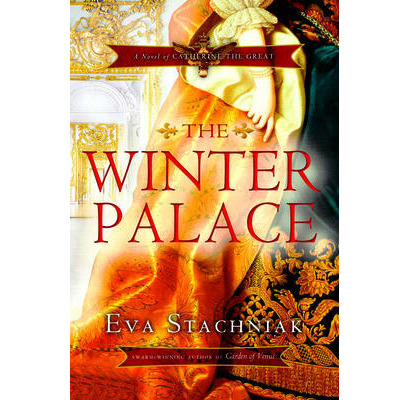
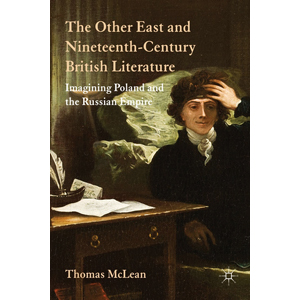

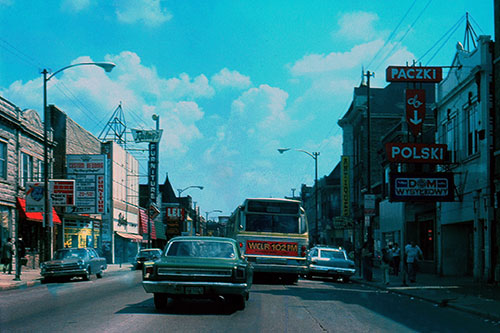
I am currently reading The Winter Palace. My question is- were the people really so cruel? It’s almost difficult to read. If it is true, it makes me wonder if people are very different today, manipulation, lies, selfishness, cruel, narcissistic.
Thank you.